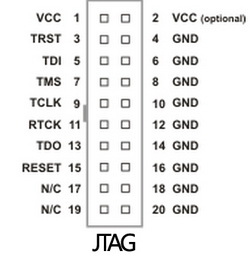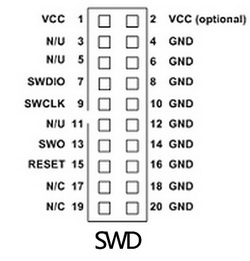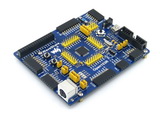Details
STM32 development board designed for STM32F103R series, features the STM32F103RCT6 MCU, and integrates various standard interfaces, pretty easy for peripheral expansions.

Overview
Open103R is a STM32 development board that features a STM32F103RCT6 device as the microcontroller. There are further expansions with various optional accessory boards for specific application. The modular and open design makes it the ideal for starting application development with STM32F family.
What's On Board

- STM32F103RCT6:the high performance STM32 MCU in LQFP64 package which features
- Core: ARM Cortex-M3 32-bit RISC;
- Operating Frequency: 72MHz, 1.25 DMIPS/MHz;
- I/Os: 51;
- Operating Voltage: 2-3.6V;
- Memories: 256kB Flash, 48kB RAM;
- Communication Interfaces: 2 x SPI, 5 x USART, 2 x I2S, 2 x I2C, 1 x SDIO, 1 x USB, 1 x CAN;
- AD & DA converters: 3 x AD(12-bit, 1μs, shares 16 channels); 2 x DA(12-bit);
- Debugging/Programming: supports JTAG/SWD (serial wire debug) interfaces, supports IAP;
- AMS1117-3.3: 3.3V voltage regulator;
- Power supply switch: 5V DC or USB;
- Power indicator;
- LEDs: Convenient for indicating I/O status or program debugging running state;
- Reset button;
- User key;
- Joystick: Convenient for I/O input (five positions);
- 32.768K crystal oscillator: used for internal RTC, also supports clock calibration;
- 8M crystal oscillator: enables the MCU run at 72M frequency by frequency multiplication;
- SDIO interface: connects to the Micro SD adapter easily, It is much faster to read/write the Micro SD card via SDIO than via SPI;
- 8 I/O Interface: easily connects to keypad, motor, etc.;
- CAN interface: communicates with accessory board which features the CAN device conveniently;
- SPI1 / SPI2 interface
- Easily connects to SPI peripherals such as FLASH (AT45DBxx), SD card, MP3, etc.;
- Convenient for connecting AD, DA module, thanks to the SPI1 alternative function - AD&DA;
- I2C1 / I2C2 interface: easily connects to I2C peripherals such as I/O expander (PCF8574), EEPROM (AT24Cxx), etc.;
- LCD interface: easily connects to the touch screen LCD;
- ONE-WIRE interface: easily connects to ONE-WIRE devices (TO-92 package), such as temperature sensor (DS18B20), electronic registration number (DS2401), etc.
- PS/2 interface: easily connects to PS/2 keyboard or mouse;
- USART1 interface: easily connects to RS232, RS485, USB TO 232;
- USART2 interface: easily connects to RS232, RS485, USB TO 232;
- USB port: USB communication between board and PC;
- 5V DC jack;
- 5V/3.3 V power input/output, usually used for power output, or common ground with other user board;
- MCU pins connector: all the MCU pins are accessible on expansion connectors for further expansion;
- JTAG/SWD interface: for debugging/programming;
- Boot mode selection: for configuring the BOOT0 and BOOT1 pins;
- USB enable jumper
- Short the jumper to enable the PC auto detection while USB connecting;
- Open the jumper to disable;
- PS/2 interface jumper
- Short the jumper to connect the PS/2 device to I/Os used in example code;
- Open the jumper to connect the PS/2 device to other custom pins via jumper wires;
- LEDs jumper
- Short the jumper to connect the LEDs to I/Os used in example code;
- Open the jumper to connect the LEDs to other custom pins via jumper wires;
- User key jumper
- Short the jumper to connect the user key to I/Os used in example code;
- Open the jumper to connect the user key to other custom pins via jumper wires;
- Joystick jumper
- Short the jumper to connect the joystick to I/Os used in example code;
- Open the jumper to connect the joystick to other custom pins via jumper wires;
- VBAT selection jumper
- Short the jumper to use system power supply;
- Open the jumper to connect the VBAT to external power, such as battery;
Photos
Note:
The Open103R supports programming via STM32 USART bootloader, a USB TO UART accessory board is also provided in the package.
The Open103R does NOT integrate any debugging function, a debugger is required.
The Open103R Standard includes only ONE accessory board -- PL2303 USB UART Board (mini).
JTAG/SWD Interfaces
The figure 1, and 2 show the header pinouts of JTAG/SWD interface
Figure 1. JTAG Header Pinout


Figure 2. SWD Header Pinout


Development Resources
- Related softwares (KEIL etc.)
- Demo code (examples in C, μC/OS-II)
- Schematic (PDF)
- STM32 development documentations (Datasheet etc.)
















